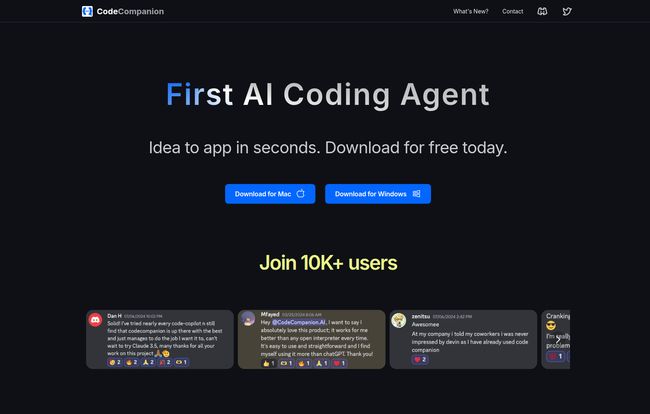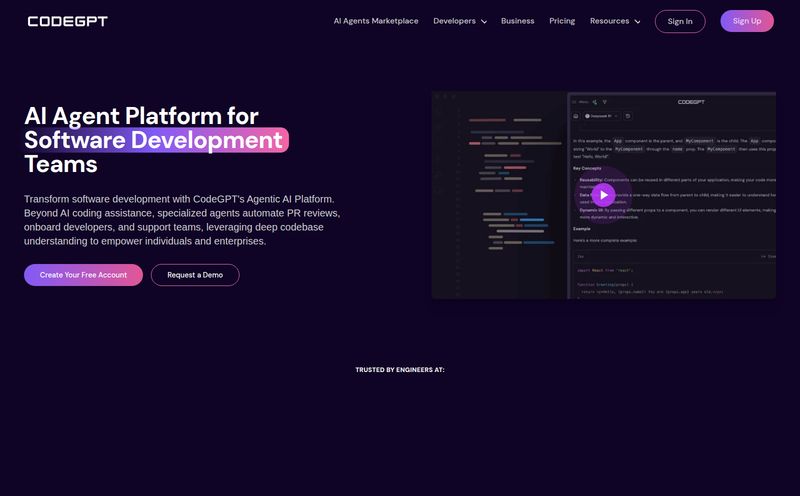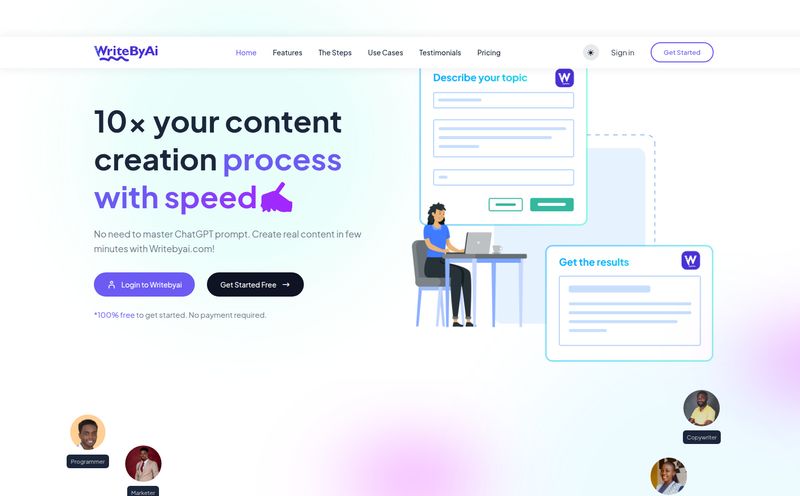Alright, let’s talk. Every week, it feels like there’s a new “revolutionary” AI tool that promises to change the way we work. As someone who’s been in the SEO and dev world for years, my hype meter is pretty well-calibrated. It takes a lot to get me genuinely excited. Most of the time, it's just another wrapper for an API we already use, packaged in a slick UI. But every now and then, something comes along that makes me lean in a little closer. This week, that something is CodeCompanion.AI.
The headline on their site is bold: “First AI Coding Agent.” Not an assistant, not a helper. An agent. That implies a level of autonomy that’s a step beyond what many of us are used to with tools like GitHub Copilot. It claims it can take an idea to an app in seconds. A bold claim, indeed. So, I decided to pop the hood and see if this thing is just another shiny object or if it's the real deal.

Visit CodeCompanion.AI
So, What Is CodeCompanion.AI Exactly?
In a nutshell, CodeCompanion.AI is a standalone desktop application for both Mac and Windows. This isn't just another extension you plug into VS Code. It’s its own environment, designed to be a central hub for your development tasks. The core idea is that you have a conversation with an AI that doesn’t just suggest code snippets; it understands the entire context of your project. It can read your existing files, write new code, and even modify what’s already there.
Think of it less like a super-smart autocomplete and more like having a junior dev you can talk to. One that has instant access to your terminal, a web browser, and your entire codebase. You can tell it, “Scaffold a new React component for a user profile page,” and it doesn’t just spit out a generic block of code. It looks at your project structure, your styling conventions, and generates the necessary files in the right places. It's an ambitious concept, and frankly, one I've been waiting for.
The Features That Actually Matter
A long list of features is great for a landing page, but which ones actually move the needle on a day-to-day basis? After digging in, a few things really stood out to me.
It Knows Your Whole Project
This is the big one. The biggest frustration I have with many AI chat tools is their tiny context window. You paste in a snippet of code, ask a question, and it gives you an answer in a vacuum. CodeCompanion.AI’s promise to “know your entire codebase” is its killer feature. It scans your project to find all the relevant information before it even starts to work on your request. This means the suggestions and modifications it makes are tailored to your project, not some generic template. This contextual awareness is the holy grail for practical AI assistance in coding.
An Integrated Terminal and Browser
Here’s where the “agent” part starts to feel real. CodeCompanion.AI can execute shell commands. You can ask it to install a dependency, run a build script, or start a server, and it just… does it. It also has a built-in browser, so if it needs to, say, fetch the latest documentation for a library you’re using, it can go do that on its own to inform the code it writes. I’ve seen it automatically fix developer console errors by searching for the solution and then applying it. It's a bit spooky, but also incredibly powerful.
From Plain English to… Well, Anything
The natural language interface is smooth. The ability to translate a simple sentence into a complex SQL query is a godsend, especially for those of us who aren't database wizards. The multi-language support is also broad, covering the usual suspects like Python, JavaScript, and Java, but also frameworks and platforms. It’s designed to be a versatile partner, regardless of your stack. The automation of repetitive tasks—generating files, writing boilerplate—is where you’ll see the immediate time savings. It's the grunt work that drains our creative energy, and this tool seems hell-bent on eliminating it.
The Good, The Bad, and The Codey
No tool is perfect, right? Let's get real about the pros and the cons. I've seen enough to have some strong opinions here.
On one hand, the potential for enhanced productivity is massive. Automating repetitive tasks and getting a context-aware AI partner could genuinely free up hours in a developer's week. The fact that it supports multiple programming languages and keeps your data locally for privacy and security is a huge plus. In an age of cloud-everything, having an AI tool that isn’t constantly phoning home with my proprietary code is a massive relief. I’ve always felt that privacy is an afterthought for many dev tools, so this is a refreshing change of pace.
However, there are a few things to keep in mind. The tool relies on the OpenAI API for some of its magic, which means you’re still tied to another company's infrastructure. The documentation mentions GPT-3.5, which, let's be honest, can feel a bit dated for really complex logic compared to GPT-4. I'm hoping there's an option to upgrade or that they integrate more powerful models soon. Finally, the fact that it’s a separate desktop application might be a hurdle for some. We developers love our cozy, customized IDEs, and switching to another window can feel like a disruption to the workflow. It's a different model than the deeply integrated Copilot.
So, How Much Does This AI Magic Cost?
This is the million-dollar question. And right now, the answer seems to be… nothing. The website prominently features a “Download for Free” button, and there’s no pricing page to be found. This usually means one of a few things: the tool is in a public beta to gather users and feedback, it's operating on a freemium model where core features are free, or they just haven't figured out the pricing yet. My guess is it’s the former. They’re likely trying to build their user base (the site says “Join 10K+ users”) before introducing paid tiers. For now, you can try it out without pulling out your credit card, which is always a win in my book. But I'd keep an eye out for pricing changes as the product matures.
Who Is CodeCompanion.AI Really For?
I see a few groups getting a ton of value out of this. Solo developers and small teams who need an extra pair of hands but don't have the budget for another full-time dev will find this incredibly useful. It's also fantastic for programmers learning a new language or framework. Being able to ask questions and see how code should be structured in a new environment is a powerful learning tool. And honestly, any developer who is tired of writing the same boilerplate over and over again will find a friend in CodeCompanion.AI.
Frequently Asked Questions
Is CodeCompanion.AI safe to use with my private code?
One of its main selling points is privacy. It runs locally on your desktop and is designed to keep your codebase secure on your machine. This is a significant advantage over some cloud-based AI tools.
Does it work with my favorite programming language?
It supports a wide array of languages and frameworks, including popular ones like Python, JavaScript (with frameworks like React), and more. The goal is to be stack-agnostic, so there's a good chance your preferred language is covered.
How is CodeCompanion.AI different from GitHub Copilot?
Think of Copilot as an inline autocomplete on steroids—it suggests code as you type inside your IDE. CodeCompanion.AI is more of a conversational agent in a separate application that can understand your entire project, execute commands, and perform more complex, multi-step tasks based on your instructions.
Is CodeCompanion.AI really free?
Currently, it is available as a free download. This might change in the future as it moves out of a likely beta period, but for now, you can use it without any cost. Always check their official website for the most current information.
Do I need my own OpenAI API key to use it?
The documentation implies a reliance on OpenAI's models, but it seems to be handled by the application itself, at least for now. You don't appear to need to provide your own personal API key to get started, which simplifies the setup process considerably.
Can it actually run commands on my computer?
Yes. The integrated terminal allows the AI to execute shell commands at your request. This is a powerful feature that enables it to manage dependencies, run scripts, and interact with your system in a way most other code assistants can’t.
My Final Verdict on CodeCompanion.AI
So, is CodeCompanion.AI the future? It's too early to say for sure, but it’s one of the most interesting and practical implementations of an AI “agent” for developers that I’ve seen. It’s not just a chatbot; it’s a tool that actively participates in the development workflow. The local-first approach to privacy is a breath of fresh air, and the ability to understand an entire codebase is a genuine leap forward.
It has its quirks and dependencies, sure. And it won't replace a senior developer's intuition anytime soon. But as a partner to handle the tedious, time-consuming tasks? I'm sold. It has the potential to be a standard part of the developer's toolkit. My advice? Download it while it's free and give it a spin on a side project. You might just find that AI coding partner you've been waiting for. I think I have.



